
English_books / New Headway int sb
.pdf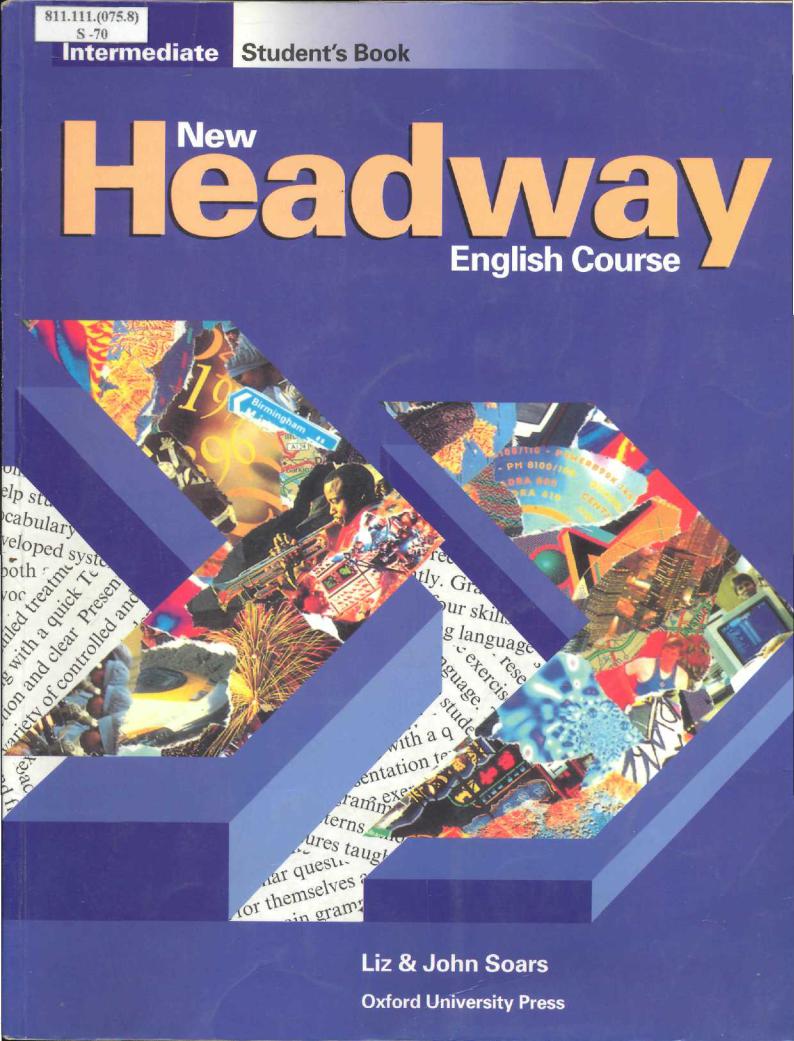
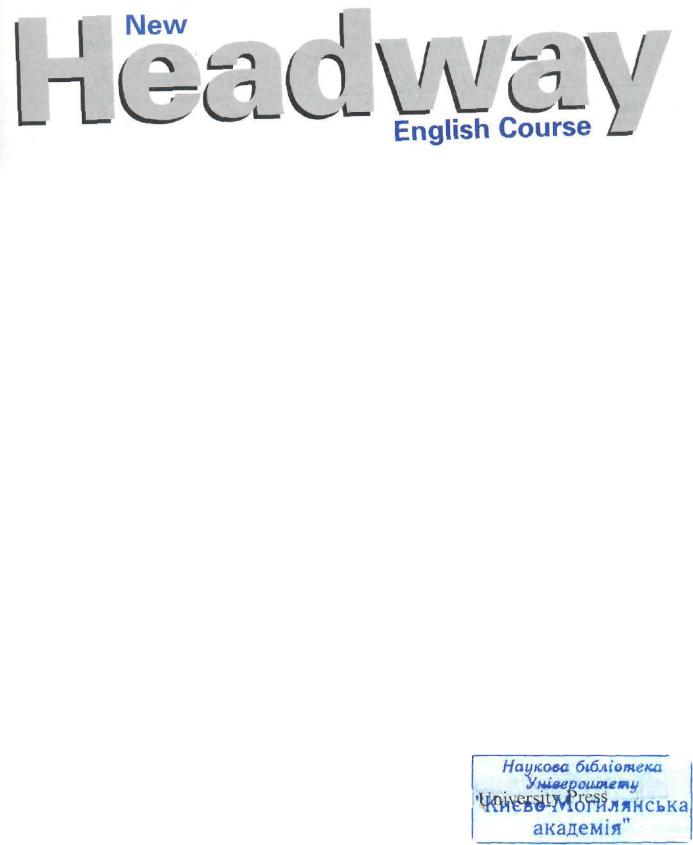
Intermediate Student's Book
Liz & John Soars
Oxford
Contents |
LANGUAGE INPUT |
Unit
1 What a wonderful world!
p6
Grammar
Auxiliary verbs
do, be, have
Naming the tenses Questions and negatives Short answers
2 Happiness! |
Present time |
|
p 15 |
Present Simple and Continuous |
|
|
Action and state verbs |
|
|
walk |
know |
|
Present passive |
|
3 Telling tales |
Past time |
|
p24 |
Past Simple and Continuous |
|
|
Past |
Simple and Past Perfect |
|
Past |
passive |
Stop and Check 1 Teacher's Book p 136
Vocabulary Postscript
Sounds and spelling meat great
I'd /ei/
Silent letters kneeIriv.l
P 12
Sports and leisure activities play tennis
go swimming do aerobics
P 2 2
Art. music and literature chapter
orchestra
Verbs and nouns that go together paint a portrait
p29
Social expressions
Never mind!
It's my round.
You must be joking! p 14
Numbers
Money, fractions, decimals, percentages, phone numbers, dates
p23
Giving opinions
What did you think of the play?
It was boring! p34
4Doing the right thing p35
5On the move p45
6Likes and dislikes p56
Modal verbs (1) |
Adjectives that describe people |
Requests and offers |
||
Obligation and permission |
punctual |
friendly |
Could you ...'.' |
|
can, have to, allowed to |
p39 |
|
Can you ...? |
|
must, mustn't, should |
Word formation |
I'll.'.. |
||
Shall I...? |
||||
|
behave - behaviour |
|||
|
p44 |
|||
|
stranger - strange |
|||
|
|
|||
|
p42 * |
|
|
|
Future forms |
The weather |
Travelling around |
||
going to and will |
storm |
shower |
Using public transport |
|
Present Continuous |
chilly |
freezing |
Requests in a hotel |
|
p50 |
|
|||
|
|
p55 |
||
|
|
|
||
Questions with like |
Words that go together |
Signs and soundbites |
||
Do you like tea? |
tall people |
Dry clean only |
||
What's she like? |
historic town |
I'm just looking, thank you. |
||
Verb patterns |
rich food |
p64 |
||
|
|
|
||
want to do enjoy meeting
p59
Stop and Check 2 Teacher's Book p 138
2 Contents Language input
SKILLS DEVELOPMENT |
|
|
|
• Speaking |
• Listening |
'Wonders of the modern world' |
Information gap - |
A group of people talk about |
p 10 |
The life of a Times |
their wonders of the modern |
|
journalist p 9 |
world T.6 |
|
Discussion - What's |
p l l |
|
|
|
|
the most important |
|
|
invention? p 12 |
|
'Sister Wendy, TV star' - the nun who is also a TV star p20
'The writer, the painter and the musician' (jigsaw)
p30
'A world guide to good manners' - how to behave properly in different parts of the world
p40
'If it's Tuesday we must be in Munich' - American tourists in Europe
P51
'In search of (good) English food' - a history of English food
p60
Discussion - What's important to you in
life? Clothes? Travel? p 21
Talking about your favourite sports p 22
Talking about your favourite poem, piece of music, or painting p 29
Exchanging information about a famous writer, painter and musician p 30
Three people talk about their favourite sport or leisure activity T.I 5
p22
'The holiday that wasn't' - a frightening holiday experience T.23
p33
Talking about school rules p 37
Nationality stereotypes p 39
Discussion - the rules of etiquette in different countries p 41
Arranging to meet p 49
Class survey - favourite holidays p 53
Talking about food, cooking and restaurants p 61
Exchanging information about capital cities p 62
School days long ago T.26 p37
Entertaining friends in three different countries T.29 p42
The geography of the British Isles T.36
A weather forecast T.37 p50
Two English people talk about living in New York; an American gives her impressions of living in London (jigsaw) T.46
p62
• Writing
Correcting language mistakes in an informal letter
Symbols for correction p l 3
Descriptive writing (1) Describing a person
Adverbs of degree quite young rather attractive p22
Writing a narrative
My worst holiday
Adverbs suddenly however
P 33
Filling in a form p43
Sending a fax p 54
Descriptive writing (2) Describing a room p63
Relative pronouns who, which, that, where,whose p64
Skills Development Contents 3
|
LANGUAGE INPUT |
Unit |
Grammar |
7 The world of work |
Present Perfect Simple |
p65 |
Present Perfect vs |
|
Past Simple |
|
Present Perfect passive |
Vocabulary |
Postscript |
Multi-word verbs |
On the telephone |
look after us |
Do you want to hold? |
turn on the light |
Can J take a message? |
p72 |
Leaving a message on an |
|
|
|
answer phone |
|
p75 |
8 |
Imagine! |
Conditionals |
Base and strong adjectives |
||
|
p76 |
First conditional |
big huge |
|
|
|
|
Second conditional |
p82 |
|
|
|
|
|
|
||
|
|
Zero conditional |
Modifying |
adverbs |
|
|
|
very big |
|
||
|
|
Time clauses |
|
||
|
|
absolutely enormous |
|||
|
|
when |
as soon as |
||
|
|
p82 |
|
||
|
|
|
|
|
|
9 |
Relationships |
Modal verbs (2) |
Character |
adjectives |
|
|
p86 |
Probability (present and past) |
sociable |
|
|
|
|
must |
be |
easy-going |
|
|
|
might |
have been |
p 91 |
|
|
|
can'f |
go |
|
|
|
|
could |
have gone |
|
|
Making suggestions
Let's go shopping! You ought to ask/or a pay rise.
p85
Agreeing and disagreeing
So do I! Neither do I! p95
Stop and Check 3 Teacher's Book p 140
10 Obsessions |
Present Perfect Continuous |
p96 |
Simple vs Continuous |
|
Present Perfect vs Past Simple |
|
Time expressions |
|
since I left school |
|
until 1 met Jack |
11Tell me about it! P 107
12Two weddings, a birth and a funeral!
p 116
Indirect questions
I don't know where he lives.
Question tags
It's a lovely day, isn't it?
Reported speech
Reported statements and questions
Reported commands
Stop and Check 4 Teacher's Book p 142
Compound nouns postcard
post office dining room p103
Verbs and nouns that go together
whistle a tune
Idioms
drop someone a line p 111
Words connected with birth, marriage and death honeymoon pram
Practice of the phonetic script p 120
Tapescripts p 126
Complaining too much not enough
The soup's too salty, p106
Informal language ninety quid What's up with him?
p 115
Saying sorry
Pardon?
Excuse me!
Social situations p125
Grammar Reference p 142
4 Contents Language input
SKILLS DEVELOPMENT |
|
|
|
• Speaking |
• Listening |
The modern servant' - |
Exchanging information about |
Thomas Wilson - |
the nanny, the cook and |
the lives of three modern |
a retired man talks to |
the gardener (jigsaw) |
servants p 72 |
his granddaughter |
p70 |
Roleplay - choosing a career |
about his life T.51 |
|
P 7 3 |
|
|
p72 |
|
|
|
|
|
Discussion - retirement p 74 |
|
• Writing
Formal letters
A letter of application p74
'Who wants to be a millionaire? We do!' - the ups and downs of winning a fortune
p80
Maze - you've won £5m. Where will your life go from here? p82
Discussion - Which charity would you give to? p 83
Song - 'Who wants to be a millionaire?" T.57
p80
Three charity appeals - Which one would you give to? T.59
p83
'The man who planted trees' - a short story by Jean Giono, which shows how the actions of one person can change the world
p92
'Death cigarettes? You must be joking!' - an interview with the man who markets a cigarette called Death
p 100
'You ask... we answer!' - questions and answers from a science magazine
p 112
'David Copperfield' - an extract about the day of David's birth from the novel by Charles Dickens
p 121
Quiz - What sort of person are you? p 91
Class survey about brothers and sisters p 91
Discussion •••• the right to smoke? p102
Exchanging information about two collectors p 104
Guessing game p 104
Information gap - Madame Tussaud's p 108
Stories of forgetfulness p 114
Discussion - What are the customs connected with births, weddings and funerals? p l 2 0
The day I was born! p 120
Two people talk about their families - one from a large family, the other an only child T.65
p 91
Collectors and their collections (jigsaw) T.75
pl04
'The forgetful generation' - a radio programme T.83 p 114
Two people give statements to the police (jigsaw) T.88 p119
A poem - 'Funeral blues' by W H Auden T.90
P 123
Words that join ideas
Linking devices and comment adverbs in an informal letter although however
actually anyway p84
Sentence combination Describing a person and a place
p94
Beginning and ending letters, formal and informal
p105
Producing a class poster p 113
For and against - living in the city what is more
on the plus side p114
Correcting language mistakes in an informal letter
P 124
Appendix 1 - Irregular verbs p 157 |
Appendix 2 - Verb patterns p 158 |
Index p 159 |
Phonetic symbols (inside back cover) |
Skills Development Contents 5

What a wonderful world!
Auxiliary verbs
Social expressions
Test your grammar
1 Make questions with you from the sentences.
Example
come from Australia. {Where?)
Where do you come from?
aI live in a flat near the centre of town. (Where?)
bI speak three languages. (How many?)
cI'm learning English because I need it for my job.
(Why?)
dI've been to France, Germany, Sweden, and the United States. (Which countries?)
eI was born in Dublin in 1961. (Where? When?)
fI've been learning English for three years. (How long?)
gI have two brothers and a sister. (How many?)
h I've got £10 in my pocket. {How much?) 1 I went to the cinema last night. (Where?) j I'm wearing jeans and a jumper. (What?)
In pairs, ask and answer the questions about you. Tell the class about your partner.
2Make the statements negative.
Example I smoke.
don't smoke.
aMy mother works in a bank.
bIt's raining.
cI went out last night.
dI'm learning Russian.
eWe've got a dog.
fI had a shower this morning.
gEnglish is spoken in every country in the world.
PRESENTATION
Auxiliary verbs
1 Answer the questions in the quiz.
General knowledge
QUIZ
When did the modern Olympic Games start?
a 1876 b 1888 c 1896
2 How long does it take for
the sun's rays to reach Earth?
a 8 minutes b 8 hours c 8 days
3What was Neil Armstrong doing when he said, 'That's one small step for a man, one giant leap for mankind'?
4What doesn't a vegan eat?
OIf you are buying things with rupees, which country are you in?
OWhere were the first books printed?
a Germany b Egypt
c China
6 Unit 1 What a wonderful world!
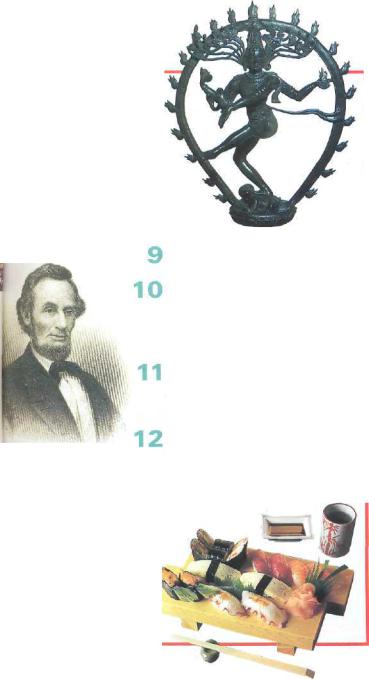
2T.1 Listen and check your answers.
3Find an example of the following tenses in the quiz.
Present Simple |
Past Simple |
Present Continuous |
Past Continuous |
Present Simple passive |
Past Simple passive |
Present Perfect Simple |
|
•Grammar question
-When do we use the auxiliary verbs do, be, and have! Think of tenses, negatives and questions.
4 Write some general knowledge questions. Ask the class.
7 In which religion are the gods Brahma, Vishnu and Siva worshipped?
;: Which record album has sold more than any other?
What does VIP stand for?
Why didn't Ben Johnson get the gold medal for the 100 metres at the Seoul Olympics?
What was Abraham Lincoln doing when he was assassinated?
How many times has Brazil won the World Cup?
 How many wings does a butterfly have?
How many wings does a butterfly have?
 If you are eating sushi, what exactly are
If you are eating sushi, what exactly are
you eating?
PRACTICE
1Grammar and pronunciation
1Correct the factual mistakes in sentences a-k and give the right information.
T.2a First listen to the sentence stress in the example.
Example
The sun rises in the west.
It doesn't rise in the west!
It rises in the east!
aThe Pope comes from Australia.
bThe teacher's wearing a swimming costume.
cPeople drive on the right in Britain.
dMy mother has got ten sisters and brothers.
eWe went to Iceland on holiday last summer.
fI had a huge breakfast.
gTt'll snow tomorrow.
hWe're learning Chinese.
iI live in a palace.
j Champagne is made in Scotland.
k |
Cats and dogs can swim. |
|||||||||||||
|
|
|
T.2b Listen and check your answers. |
|||||||||||
2 |
Write questions for the answers. |
|||||||||||||
|
|
|
Example |
|
|
|
|
|
||||||
|
|
|
How many books did you read on holiday? |
|||||||||||
|
|
|
Four. |
|
|
|
|
|
||||||
a |
What |
|
last night? |
|||||||||||
|
|
|
I stayed in and watched television. |
|||||||||||
b |
What sort of books |
|
|
|
reading? |
|||||||||
|
|
|
|
|
|
|
|
|
|
|
|
|
|
|
|
|
|
I like horror stories and science fiction. |
|||||||||||
c |
|
|
|
|
been to America? |
|||||||||
|
|
|
|
|
|
|
|
|
|
|
|
|||
|
|
|
Yes, I have. I went there last year. I really enjoyed it. |
|||||||||||
d |
What |
|
the teacher _____________? |
|||||||||||
|
|
|
|
|
|
|
|
|
|
|
|
|||
|
|
|
She's helping Maria with this exercise. |
|||||||||||
e |
|
|
|
|
your father do? |
|||||||||
|
|
|
|
|
|
|
|
|
|
|
|
|
|
|
|
|
|
He works in a bank. |
|
|
|
|
|
||||||
f |
Why |
|
your homework last night? |
|||||||||||
|
|
|
Because I didn't feel well. |
|||||||||||
g |
How long |
|
|
it take you to come to |
||||||||||
|
|
|
school? |
|
|
|
|
|
|
|||||
|
|
|
It takes me about twenty minutes. I come by bus. |
|||||||||||
h |
What |
|
|
doing next weekend? |
||||||||||
|
|
|
I don't know. I haven't got any plans yet. |
|||||||||||
i |
|
|
|
|
you |
|
|
|
|
a CD player at |
||||
|
|
|
home? |
|
|
|
|
|
|
|
||||
No, I haven't. Just a tape recorder.
In pairs, ask and answer the questions about you.
What a wonderful world! Unit 1 7
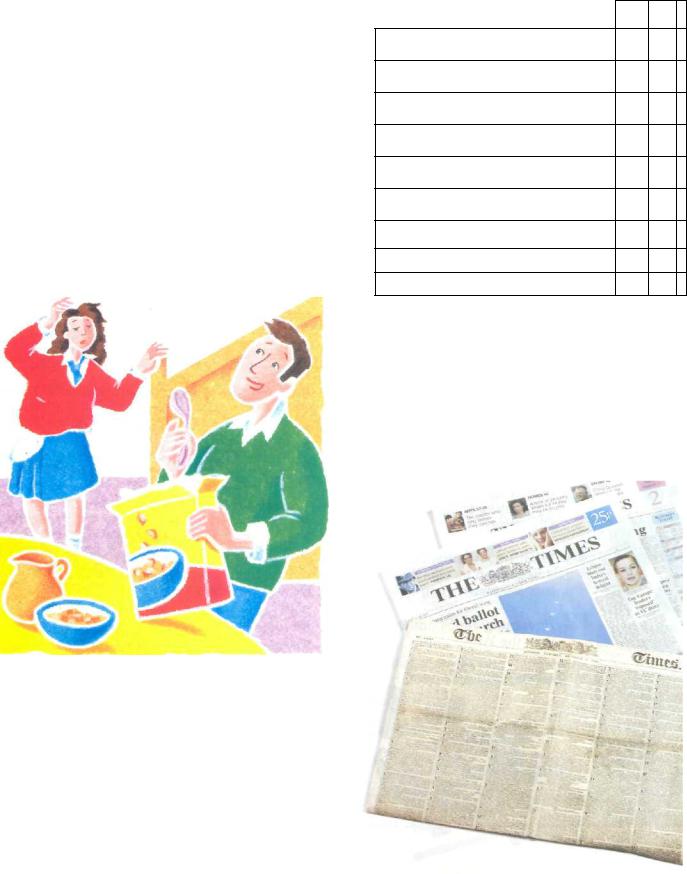
2 is or has?
T.3 Listen to the sentences. They all contain 's.
Say if 's = is or 's = has.
Example
She's got a BMW. has
Peter's waiting near the door, is
3 Short answers
1 T.4a |
Read and listen to the breakfast conversation. |
Dad |
Morning! Did you sleep well? |
Emma |
Yes. |
Dad |
Do you want any breakfast? |
Emma |
No. I'm not hungry. |
Dad |
Oh. Have you fed the cat? |
Emma |
Yes. |
Dad |
Has the post come? |
Emma |
No. • |
Dad |
OK. Are you going to be late tonight? |
Emma |
No. I'll be back at the usual time. |
4Stand up! Ask three students the following yes/no questions. Add one or two questions of your own. I a tick (/) or a cross (X) in the columns. Give short answers in your reply.
S1 S2
Do you play a musical instrument?
Does anyone in your family smoke?
Have you got any pets?
Can you cook?
Are you going out tonight?
Did you watch TV last night?
Have you been to the cinema recently?
4 Reading and tenses
Read the text about The Times newspaper. Put the verb in brackets into the correct tense. There are examples active and passive sentences.
Example
The Times is printed (print) six days a week, from Monday to Saturday.
2 T.4b Listen to a similar dialogue. What's the difference?
We use short answers in spoken English because yes or no on its own can sound impolite.
Practise the dialogue using short answers.
3 T.5 Answer the questions you hear with a short answer.
8 Unit 1 What a wonderful world!
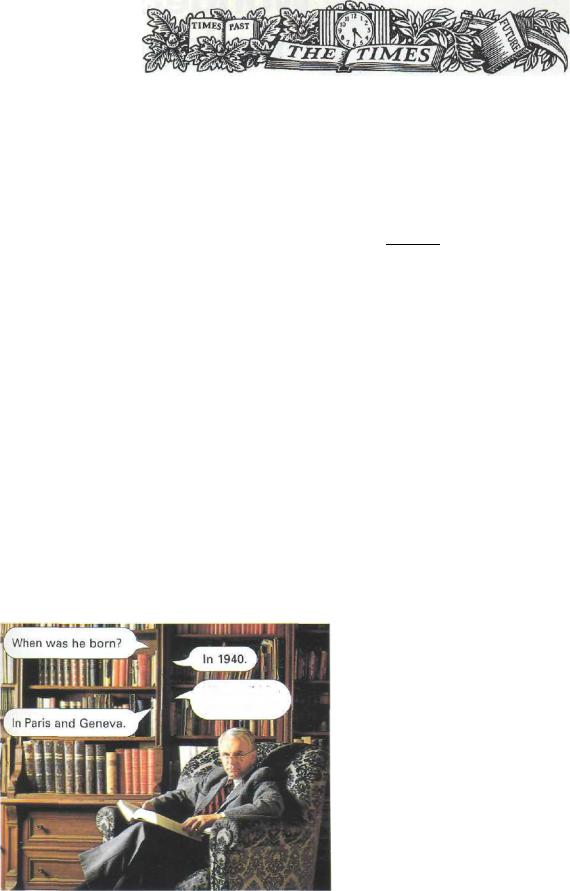
The Times, symbol of tradition and establishment
THE TIMES is one of Britain's oldest and most
influential newspapers. It (a) |
|
|
(begin) |
||||
|
|
|
|
|
|
|
|
its life in 1785. It (b) |
|
|
(start) by John |
||||
|
|
|
|
|
|
||
Walter. In those days it (c) |
|
|
(cost) |
||||
|
|
|
|
|
|
||
two and a half old pennies. |
|
|
|
|
|||
In the nineteenth century, The Times
(d) |
(develop) a reputation for |
||||
|
|
|
|
|
|
accurate reporting and independent editorial |
|||||
views. Now it (e) |
(sell) over |
||||
|
|
|
|
|
|
650,000 copies a day. It (f) |
|
(publish) |
|||
|
|
|
|
|
|
5 Speaking
Work in pairs. Your teacher will give you some information about a journalist called Charles Hendrickson, who has worked for The Times and other newspapers. You will not have the same information as your partner.
Ask and answer questions to complete the mformation.
Example
Student A |
Student B |
Charles Hendrickson was |
Charles Hendrickson |
born in ... (When?). |
was born in 1940. He |
He went to school in Paris |
went to school in ... |
and Geneva. |
(Where?). |
Where did he go to school?
in London, along with its sister newspaper, The
Sunday Times, which (g) |
. . |
(have) at |
||||
|
|
|
|
|
|
|
least ten sections and takes all week to read!
'The Times (h) |
(have) an excellent |
|
|
|
|
reputation for over 200 years,' said its editor, who
(i)_ _ _ (work) for the paper since 1980,
'and now we (j) — |
(try) our best to |
|
|
|
|
continue that tradition in order to produce a newspaper for the twenty-first century.'
LANGUAGE REVIEW
Auxiliary verbs
The auxiliary verbs do, be and have are used to express various grammatical functions, for example to form questions and negatives, and to form tenses.
do
Do, does and did are used to form the question and negative in the Present Simple and the Past Simple.
Where do you work? |
I don't like the rain. |
What does she do? |
He doesn't want to go home. |
Why did you go to Paris? |
We didn't buy anything. |
be
Be is used with -ing forms and past participle forms to make continuous and passive verb forms.
She's wearing new shoes.
What were you doing this morning?
I'vebeen learning English for three years.
have
The Times is published in
London.
I was born in India.
My money's been stolen.
Have is used to make perfect verb forms.
Have you ever seen a ghost?
She's been waiting for two hours.
Grammar Reference: page 142.
What a wonderful world! Unit 1 9
